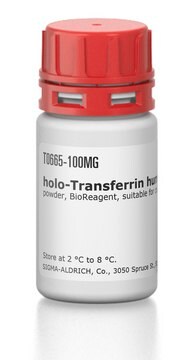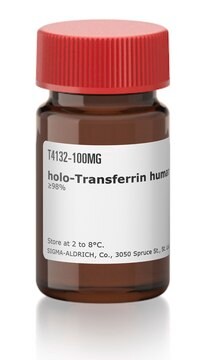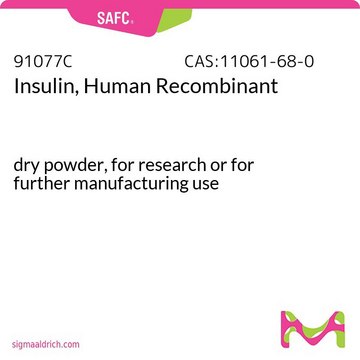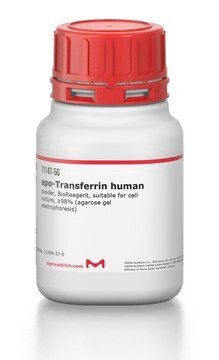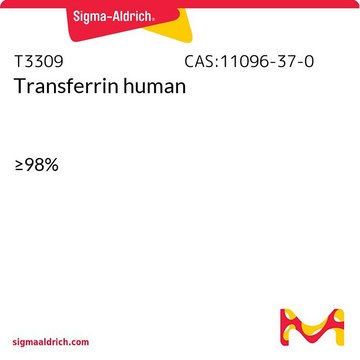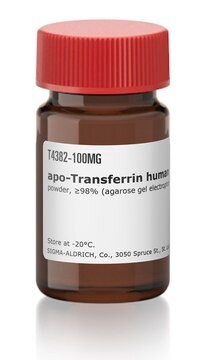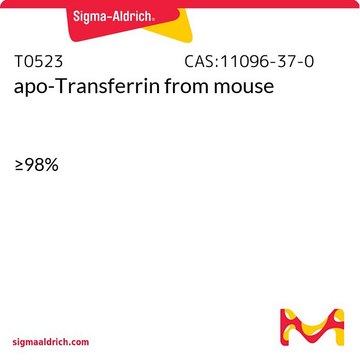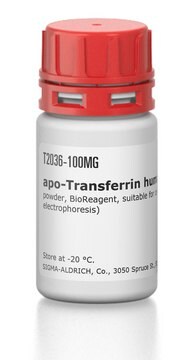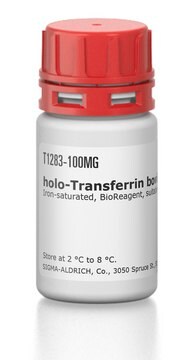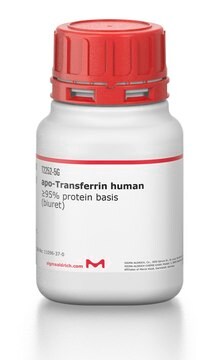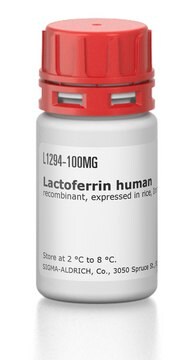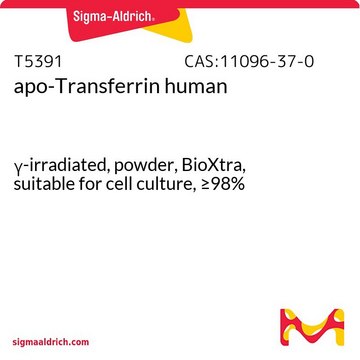SRP6512
Transferrin (HOLO) from human plasma
≥95% (SDS-PAGE)
Sinónimos:
DKFZp781D0156, PRO1557, PRO2086, Siderophilin, TF
Iniciar sesiónpara Ver la Fijación de precios por contrato y de la organización
About This Item
UNSPSC Code:
12352202
NACRES:
NA.32
Productos recomendados
General description
Transferrin is a monomeric glycoprotein found in plasma at an average concentration of 250 mg/100ml. Transferrin (TF) belongs to the family of bilobal glycoproteins which tightly bind ferric iron. Each of the homologous N- and C-lobes of the protein contains a single iron-binding site present in a deep cleft.
Application
Transferrin (HOLO) from human plasma has been used in flow cytometry.
Biochem/physiol Actions
Transferrin (TF) serves as the iron transport protein in the blood. Iron is transported in the serum by binding to circulating transferrin, which in turn binds to receptors on the cell surface. Stored in bone marrow as TF-bound iron, it also possesses bacteriostatic and fungistatic activity. At the alkaline extracellular pH of 7.4, TF binds one or two ferric ions and two iron-bound TF molecules can bind the dimeric transferrin receptor (TfR). At this pH, iron-free transferrin is not recognized by TfR. This is followed by an endocytotic pathway involving the TfR, where the entire complex is internalized by endocytosis. When the pH is reduced in the cell, iron is released from TF leading to a conformational change in each lobe. Two critical lysines in the N-lobe of TF aid this conformational change allowing entry of a chelator to capture the iron. Finally, the complex gets back to the cell surface and the extracellular pH causes the dissociation of the apo-TF molecules from the receptor. Clinically, decreases in transferrin are observed in congenital disorders, newborns, inflammatory diseases, hypo-proteinemias and nephritic syndrome; increases are found in pregnancy, iron-deficiency anemias and inoculation hepatitis. Transferrin is required by all types of cells in cultures for maximal growth. It is, therefore, an important factor used in defined culture media.
Physical form
Lyophilized from 20 mM Na phosphate, pH 7.4 and 150 mM NaCI.
Storage Class
11 - Combustible Solids
wgk_germany
WGK 3
flash_point_f
Not applicable
flash_point_c
Not applicable
Elija entre una de las versiones más recientes:
Certificados de análisis (COA)
Lot/Batch Number
¿No ve la versión correcta?
Si necesita una versión concreta, puede buscar un certificado específico por el número de lote.
¿Ya tiene este producto?
Encuentre la documentación para los productos que ha comprado recientemente en la Biblioteca de documentos.
Los clientes también vieron
Transferrin receptor 1 is a cellular receptor for New World haemorrhagic fever arenaviruses
Sheli R
Nature (2007)
Peter J Halbrooks et al.
Biochemistry, 44(47), 15451-15460 (2005-11-23)
The transferrins (TF) are a family of bilobal glycoproteins that tightly bind ferric iron. Each of the homologous N- and C-lobes contains a single iron-binding site situated in a deep cleft. Human serum transferrin (hTF) serves as the iron transport
Yifan Cheng et al.
Cell, 116(4), 565-576 (2004-02-26)
Iron, insoluble as free Fe(3+) and toxic as free Fe(2+), is distributed through the body as Fe(3+) bound to transferrin (Tf) for delivery to cells by endocytosis of its complex with transferrin receptor (TfR). Although much is understood of the
Nuestro equipo de científicos tiene experiencia en todas las áreas de investigación: Ciencias de la vida, Ciencia de los materiales, Síntesis química, Cromatografía, Analítica y muchas otras.
Póngase en contacto con el Servicio técnico